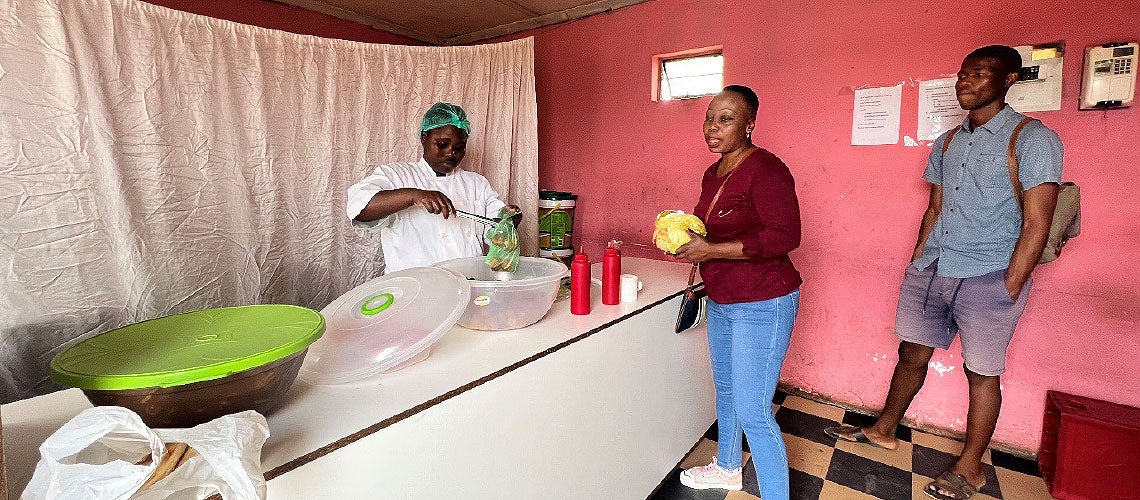 enehelo has had to raise prices because cooking oil has become expensive
enehelo has had to raise prices because cooking oil has become expensive
As you walk through the door of a small fast-food establishment in Ha Tsolo, Maseru you are greeted by a notice on the wall. The notice reads, “New price list starting from September 1, 2022”. Despite the price change, the shop is busy, customers can be seen entering the small shop, buying their food, while some take time to examine the price changes, groan and even challenge the owner on the increase. The owner, Qenehelo Moshoeshoe, is 29 years of age and a mother of a 4-year-old daughter. She is among the many Basotho business owners affected by continuously rising food prices.
Qenehelo started her business in September 2019 after she completed her diploma in Home Economics Education from the Lesotho Agriculture College. She sells fatcakes, potato chips, and other fast food to factory workers, school kids, construction workers, and people from the nearby settlement. Qenehelo’s business was negatively affected by the movement restrictions during the height of the COVID-19 pandemic in 2020. “Fortunately, my landlord allowed me to skip rent for a few months and that helped a lot,” she says.
“Business is tough nowadays, the incessant increasing prices of cooking oil, electricity, and other amenities have left us no choice but to also increase prices if we are to break even in our businesses and not make a loss,” Qenehelo says. As her food relies heavily on cooking oil, she had to find suppliers that are a bit cheaper. “More than anything, I have had to look for better deals and also sought ways to lower costs while still providing quality products. I sometimes have to reuse the cooking oil more times than I would like to. I am also worried about the purchasing power of my customers as many are also facing hard times. In fact, as most of my customers are also factory workers, the income is going to decline as some factories are closing earlier than usual, two months prior to December holidays.”
She also indicated that she used to be able to save up enough money to buy her stock of supplies in bulk but these days, she has to wait for income from the current stock to buy more. “Electricity is also expensive and like buying stock, I can no longer afford to buy a lot of it, but rather buy it according to the income earned. I am also more vigilant about how I use electricity. I switch off lights and appliances when they are not in use.”
Qenehelo grew up helping her grandmother sell fatcakes to factory workers. “I used to watch out to see who doesn’t pay and then make my grandmother aware,” she says with a smile. “After I completed my degree, I didn’t go looking for a job like other graduates. I decided to use the skills I gained from my home economics courses to make a living.”
Qenehelo says she always knew she would be a businessperson. She shares that she wasn’t attracted to entrepreneurship because of the glamour or fame that is portrayed on social media, but rather because she finds that it is the best way for her to support her family of three, and her uncle and nephews.
Despite the challenges she faces, Qenehelo says that she remains hopeful for the future even though it doesn’t seem like there will be any changes soon. “I am a businessperson and I would like to expand my food business,” she states enthusiastically.
Like many countries around the world Lesotho has been negatively affected by the war in Ukraine. The situation has been worsened by hindered food imports due to the pandemic as well as weak agricultural production due to floods. In Lesotho, inflation is projected to increase by 7.5% . Inflationary pressures worsened in 2021 due to the impact of COVID-19, resulting in annual inflation accelerating from 5.0% in 2020 to 6.0% in 2021. July 2022 saw inflation accelerate to a peak of 9.8% in, largely driven by food and energy prices.
Rising food prices and high rates of unemployment, 38.3%, continue to dictate the high poverty rates in Lesotho. 35.8% of the population is projected to have been living below the $2.15 line in 2021, about 3 percentage points higher than pre-pandemic levels. The poverty rate is projected to fall at a slow rate and reach 34.1 by 2024.
To support the government of Lesotho, t World Bank is financing a $26.5 million social assistance project that aims to support poor and vulnerable households to engage in productive economic activities, as well as work with the Ministry of Social Development to strengthen their social protection systems and support digitalization.
To promote youth and women participation in Lesotho’s private sector, the World Bank is financing a $45 million project that will increase access to business support services and financial products targeted at micro, small, and medium enterprises (MSMEs) and entrepreneurs, especially women and youth. The project is co-financed by a Global Risk Financing Facility (GRiF) grant in the amount of $7.5 million.





Join the Conversation